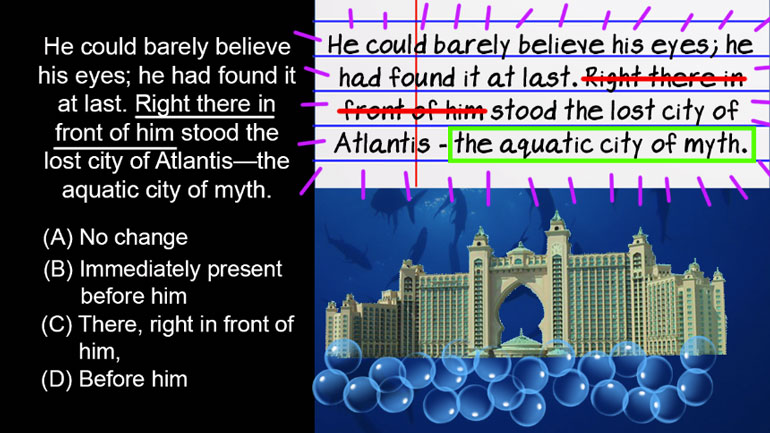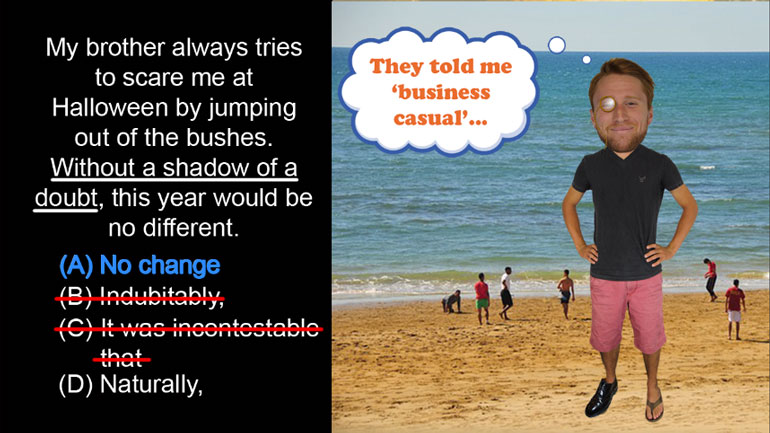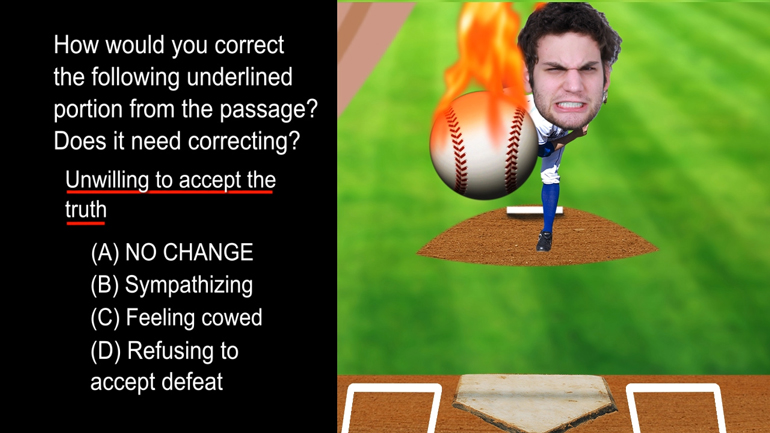ShmoopTube
Where Monty Python meets your 10th grade teacher.
Search Thousands of Shmoop Videos
Diction Videos 15 videos
ACT English: Style Drill 1, Problem 1. Does the underlined portion match the style?
ACT English: Style Drill 1, Problem 2. Which of the choices best matches the tone of the passage?
ACT English: Style Drill 1, Problem 3. Which choice best matches the formality of the sentence?
ACT English 4.10 Passage Drill 186 Views
Share It!
Description:
ACT English: Passage Drill Drill 4, Problem 10. Should the writer change the exclamation mark into a period in the previous sentence?
Transcript
- 00:03
Here’s your Shmoop du jour, brought to you by the Kitamura FCM-8006W.
- 00:09
Which won the award for most unimaginative name for a fortune cookie machine in 1981 and 1982.
- 00:32
The writer is considering changing the exclamation
- 00:34
mark in the previous sentence to a period. Should the writer make this change?
- 00:38
And here are the potential answers...
Full Transcript
- 00:43
The author is right to be wary of the exclamation mark.
- 00:46
Exclamation marks should only be used if we have something astounding to say;
- 00:53
they should be reserved for when we want to put some extra oomph behind a sentence.
- 00:58
Overuse maxes out the volume on every sentence, making it impossible to emphasize the thing
- 01:03
we really want people to hear.
- 01:05
With that in mind, let’s go through the answer options to see if we can find a reason
- 01:09
to get rid of the exclamation mark in this question.
- 01:12
Option B.
- 01:13
Option (B) isn’t a good reason to nix an exclamation mark; they have nothing to do
- 01:17
with whether a sentence is closely related to the topic at hand.
- 01:20
We want to cut things that are irrelevant, right?
- 01:23
Why would we want to broadcast them to the world?
- 01:25
Choice (A) give us no valid reason to cut the exclamation mark either. It doesn’t
- 01:29
matter if one has been previously used in the passage.
- 01:32
As we said before, exclamation marks do their jobs best when there aren’t many of them.
- 01:37
They’re a tool to help a writer make a particular sentence stand out from the crowd.
- 01:41
We’re gonna say no to choice (D) as well.
- 01:43
The language in the passage is far from academic or dense.
- 01:47
In fact, it’s pretty casual and easy-going.
- 01:50
Anyway, if we were trying to write something super academic, we wouldn’t want to throw
- 01:54
in an exclamation mark simply to lighten things up.
- 01:57
It would feel random, and then people would see through how smart we were trying to sound.
- 02:01
(C) is the right answer because it correctly identifies the tone of the passage and the
- 02:05
role of the sentence within it.
- 02:07
This passage is informal, so it can totally get away with an exclamation mark.
- 02:11
After all, 8,000 cookies is a lot for one machine to make in an hour!
- 02:17
Did you hear that exclamation mark we just used?
- 02:34
Boom.
Related Videos
ACT English: Punctuation Drill 2, Problem 2. Where should the semi-colon be placed?
ACT English: Punctuation Drill 3, Problem 1. How should this sentence be changed so that it is grammatically correct?
ACT English: Punctuation Drill 3, Problem 2. How should we properly hyphenate the words in this sentence?
ACT English: Punctuation Drill 3, Problem 4. Which choice best formats this list of items?
ACT English: Punctuation Drill 2, Problem 1. Which choice of punctuation best completes the sentence?



















